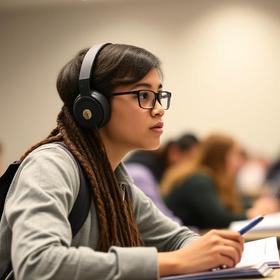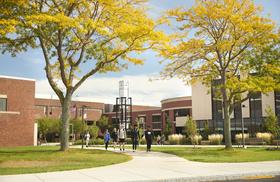In certain circles, community colleges are looked down upon. Some believe a community college degree is less valuable than one earned at a traditional four-year college or university. Many believe, however, that community colleges are the “cornerstone of American higher education.” As the country works to recover from the coronavirus pandemic, they may be more important now than ever.
Community colleges enroll nearly half of all college students and provide educational opportunities some students would otherwise not be able to access. They play a role in workforce development, local economic development, and vocational training.
The coronavirus pandemic that has stretcherding to a 2015 study cod into the summer of 2020 has changed the face of the American education system at all levels. As we look ahead to the 2020-21 school year, thousands of students find themselves wondering what their postsecondary education is going to look like. In these times of change, community colleges are becoming more critical than ever before.
The Role of Community Colleges
The significance of community college is right there in the name – community. Steven Mintz of Inside Higher Ed suggests, “community colleges have a critical role to play in addressing the country’s greatest challenges: stagnant family incomes, disparities in income and wealth, and political polarization.” These institutions play a significant role in their communities and in the more outstanding educational system.
These are some of the most critical roles community colleges play:
- Workforce development
- Local and regional economic development
- Technical and vocational training
- Human capital formation
- Low-cost gateway to higher education
- Community service
Though many in the educational community recognize the importance of community colleges, they also recognize that a stigma still exists against them. Deborah Budd, chancellor of the San Jose-Evergreen Community College District, said the following in an interview with School’s In on Stanford Radio:
“I think for many years people thought that community college was the second choice or the last choice. And very often now, it’s becoming the first choice because of the expense of a college degree… You could go to a community college and not have to pay those high fees for those first two years, and then be able to transfer. Or, you can go to a community college and get a certificate and be in a trade or go into industry and make a high wage.”
Community colleges provide access to education and vocational training for thousands on an annual basis, and yet they don’t receive the same degree of public funding. In the current era of economic disruption, it may be time to show community colleges a little more respect.
In this video, Richmond Fed Senior Policy Economist Urvi Neelakantan and Regional Economist Laura Ullrich discuss the role of community colleges in today’s economy, who these schools serve, their affordability and the opportunities they provide for workforce development.
Why Aren’t Community Colleges Funded Well?
As tuition costs increase yearly, many leaders have pushed for reforms to make higher education more affordable. Many proposed solutions involve debt forgiveness or free tuition. Still, some argue that direct financial support for community colleges would not only be more effective but would have a higher return on investment.
The average community college student pays just $3,400 a year in tuition. In contrast, the average annual tuition at a private college is nearly $37,000. As many as 120 private colleges charge tuition fees exceeding $50,000 annually, and only about 60 colleges charge less than $20,000.
Despite receiving more income from tuition, private colleges and universities also receive a more significant share of public funding. In the 10 years between 2008 and 2018, state funding for public colleges dropped by 16%. Federal financial aid grew during that time, but most of the benefits were realized by schools with higher tuition prices. According to a 2015 study completed by the American Institutes for Research, private institutions with high endowments receive eight times the public subsidy per full-time student than community colleges get.
There are arguments to be made regarding completion rates being tied to public support, but some argue that lack of support harms student success metrics.
Only about 42% of first-time college students who go to community college complete a degree within 8 years. This is significant, considering about 9 million students attend community college each year. What researchers at the University of California, Berkeley, and Harvard University found, however, is that completion rates at two-year public schools were sensitive to changes in funding. A 10% increase in institution funding was correlated with a 14.5% increase in degree and certificate completion.
The Economic Strategy Group at the Aspen Institute aims to increase completion and transfer rates among first-time college students at community colleges to 60% by 2030. They also sought to increase the number of Americans with a college degree or other high-quality credentials from 47% to 65%. They suggest a $20 billion increase in public funding will be required to achieve these goals.
Thus video explains how community colleges are funded.
How Will Community Colleges Help the Country Recover?
Within the first three weeks of nonessential business closures, nearly 17 million American workers filed for unemployment. Within a month, the unemployment rate exceeded 15%, well above the highest rate during the Great Recession. Though the economy has started to reopen, many jobs won’t return, and many have been forced to consider alternative options. Experts in higher education suggest community colleges may play a significant role in helping the nation recover from this economic crisis.
Here are some of the benefits community colleges have that may equip them to play a supportive role in the nation’s recovery:
- They provide training for the workforce needed to treat the sick and keep the nation safe
- They offer career-oriented education and training to get people back to work quickly
- They provide an affordable, flexible opportunity for first-time students seeking a degree
- They are deeply rooted in local communities, providing resources for local people
- They have a history of adapting to changing circumstances and shifting priorities
Though community college is often considered an affordable alternative to private colleges and universities, many forget that these institutions offer technical and vocational training. In an economy where millions of jobs vanished overnight, many Americans must change fields. Achieving a degree or certificate opens up those opportunities, and community colleges are perfectly positioned to help fill those needs.
Community colleges are also uniquely situated to help their local community recover. Many students have had to postpone plans to attend a residential institution in the fall, and community college allows them to continue their education without leaving home. Many community colleges also offer supportive services to help their students afford or attend class while working or caring for a family. Community colleges have a long history of adapting to the changing needs of their communities.
Whether you’re looking to expand your career opportunities or considering an alternative to a traditional college or university as a first-time student, community college is something to consider.
Tips for Choosing a Community College
Depending on where you live, you may have several community colleges to choose from. If you’re attending online, the options are nearly limitless. Before you start your search, there are a few things you should keep in mind when picking a community college.
Here are some tips for choosing the right community college:
- Think about your long-term plans and career goals – it’s essential to choose a school that offers the courses you need.
- Do research to see which schools in your area have partnerships with four-year schools if you decide to transfer.
- Check the school’s success rate and transfer statistics – if there’s a low success rate, don’t assume you’ll be in the group of students who succeed because you don’t know all the factors influencing that rate.
- Talk to an admissions counselor or academic advisor to ask questions and see if you can audit a class – you may be able to take one online.
- Look at requirements for testing and remedial education – some schools have requirements for basic math and writing, though you may be able to test out.
- Check the tuition rate, and don’t forget to ask about additional fees – community college is more affordable, but costs will vary from one school to another.
Once you’ve chosen a school, it’s time to leap. Contact the admissions office to discuss the next steps for your application. The sooner you get started, the sooner you’ll be on your way to your exciting future and the new life ahead of you.
Questions? Contact us on Facebook and Instagram. @communitycollegereview
#CommunityCollegeImportance #WorkforceDevelopment #EconomicRecovery #AffordableEducation #HigherEdAccess #communitycolleges















